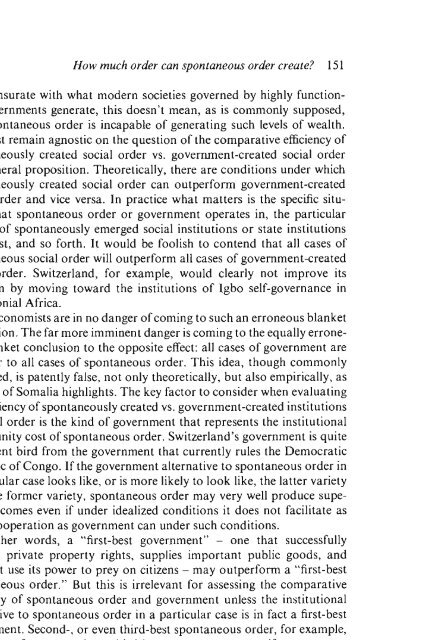Handbook on Contemporary Austrian Economics
Handbook on Contemporary Austrian Economics
Handbook on Contemporary Austrian Economics
You also want an ePaper? Increase the reach of your titles
YUMPU automatically turns print PDFs into web optimized ePapers that Google loves.
How much order can sp<strong>on</strong>taneous order create 151<br />
commensurate with what modern societies governed by highly functi<strong>on</strong>ing<br />
governments generate, this doesn't mean, as is comm<strong>on</strong>ly supposed,<br />
that sp<strong>on</strong>taneous order is incapable of generating such levels of wealth.<br />
We must remain agnostic <strong>on</strong> the questi<strong>on</strong> of the comparative efficiency of<br />
sp<strong>on</strong>taneously created social order vs. government-created social order<br />
as a general propositi<strong>on</strong>. Theoretically, there are c<strong>on</strong>diti<strong>on</strong>s under which<br />
sp<strong>on</strong>taneously created social order can outperform government-created<br />
social order and vice versa. In practice what matters is the specific situati<strong>on</strong><br />
that sp<strong>on</strong>taneous order or government operates in, the particular<br />
variety of sp<strong>on</strong>taneously emerged social instituti<strong>on</strong>s or state instituti<strong>on</strong>s<br />
that exist, and so forth. It would be foolish to c<strong>on</strong>tend that all cases of<br />
sp<strong>on</strong>taneous social order will outperform all cases of government-created<br />
social order. Switzerland, for example, would clearly not improve its<br />
situati<strong>on</strong> by moving toward the instituti<strong>on</strong>s of Igbo self-governance in<br />
pre-col<strong>on</strong>ial Africa.<br />
But ec<strong>on</strong>omists are in no danger of coming to such an err<strong>on</strong>eous blanket<br />
c<strong>on</strong>clusi<strong>on</strong>. The far more imminent danger is coming to the equally err<strong>on</strong>eous<br />
blanket c<strong>on</strong>clusi<strong>on</strong> to the opposite effect: all cases of government are<br />
superior to all cases of sp<strong>on</strong>taneous order. This idea, though comm<strong>on</strong>ly<br />
suggested, is patently false, not <strong>on</strong>ly theoretically, but also empirically, as<br />
the case of Somalia highlights. The key factor to c<strong>on</strong>sider when evaluating<br />
the efficiency of sp<strong>on</strong>taneously created vs. government-created instituti<strong>on</strong>s<br />
of social order is the kind of government that represents the instituti<strong>on</strong>al<br />
opportunity cost of sp<strong>on</strong>taneous order. Switzerland's government is quite<br />
a different bird from the government that currently rules the Democratic<br />
Republic of C<strong>on</strong>go. If the government alternative to sp<strong>on</strong>taneous order in<br />
a particular case looks like, or is more likely to look like, the latter variety<br />
than the former variety, sp<strong>on</strong>taneous order may very well produce superior<br />
outcomes even if under idealized c<strong>on</strong>diti<strong>on</strong>s it does not facilitate as<br />
much cooperati<strong>on</strong> as government can under such c<strong>on</strong>diti<strong>on</strong>s.<br />
In other words, a "first-best government" - <strong>on</strong>e that successfully<br />
protects private property rights, supplies important public goods, and<br />
does not use its power to prey <strong>on</strong> citizens - may outperform a "first-best<br />
sp<strong>on</strong>taneous order." But this is irrelevant for assessing the comparative<br />
efficiency of sp<strong>on</strong>taneous order and government unless the instituti<strong>on</strong>al<br />
alternative to sp<strong>on</strong>taneous order in a particular case is in fact a first-best<br />
government. Sec<strong>on</strong>d-, or even third-best sp<strong>on</strong>taneous order, for example,<br />
may outperform sec<strong>on</strong>d- or third-best government, even if sp<strong>on</strong>taneous<br />
order loses in the efficiency c<strong>on</strong>test when comparing first-bests. Stated differently,<br />
deviati<strong>on</strong>s from first-best government may involve larger welfare<br />
losses than deviati<strong>on</strong>s from first-best sp<strong>on</strong>taneous orders. even if first-best<br />
government outperforms first-best sp<strong>on</strong>taneous order.

















